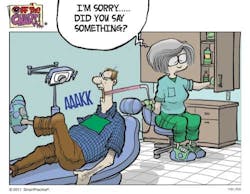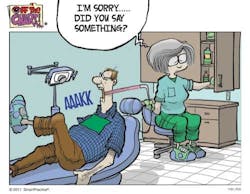Reader's Forum
Dear RDH:
What are the roles of dentists and hygienists in the fight against oral cancer? Is it limited to detection? How much time do we spend talking about the prevention of periodontal disease vs. how much time spent talking about the prevention of oral cancer? I venture to say that the disparity is great – that almost no time is taken to talk about the prevention of oral cancer. Not only is that a shame, but we are avoiding our professional responsibilities.
According to the CDC and the Oral Cancer Foundation (www.oralcancerfoundation.org), cancers of the floor of the mouth, cheeks, and alveolar ridges are associated with alcohol and tobacco use. But cancer of the base of the tongue, the throat, and the pharynx are associated with one of the same viruses that causes cervical cancer: human papilloma virus 16. HPV-16 is a sexually transmitted disease. That is why the Oral Cancer Foundation strongly supports the use of the vaccine Gardasil for both girls and boys before they become sexually active. The CDC recommends it for girls. (HPV-16 is also associated with cancer of the penis and the anus.) Parents should be urged to consult with their pediatricians about their daughters and sons being vaccinated with Gardasil.
We need to educate our patients about all known associations with the development of oral cancer, including oral sex. How do we bring up this topic? Sexual practices are not something that we in dentistry are used to discussing with our patients. We need to learn to get over this reticence. It could be a matter of life or death.
I always tell my patients what I am doing when I do an oral cancer examination. I suggest that the best time to bring up the subject of prevention is during that examination. "Do you know what the known causes of oral cancer are? One is a human papilloma virus that is passed on by oral sex, and another is alcohol and tobacco use."
From there on, you can elaborate or not, depending on your comfort zone and the questions that the patient may ask.
Becoming more knowledgeable about oral cancer will give you more confidence. Do some additional studying. Be sure to role-play this scenario with other team members in your office before you start. Speak to your doctor to decide how this subject will be broached and who will bring it up. The whole team's support is essential for this to be taken seriously. Remember, you could be saving someone's life. However, even though some young people engage in risky behavior, unless you have a parent's permission, I would restrict this message to those over 18.
Henry M. Botuck, DDS
Springfield, Virginia
Past RDH Issues

